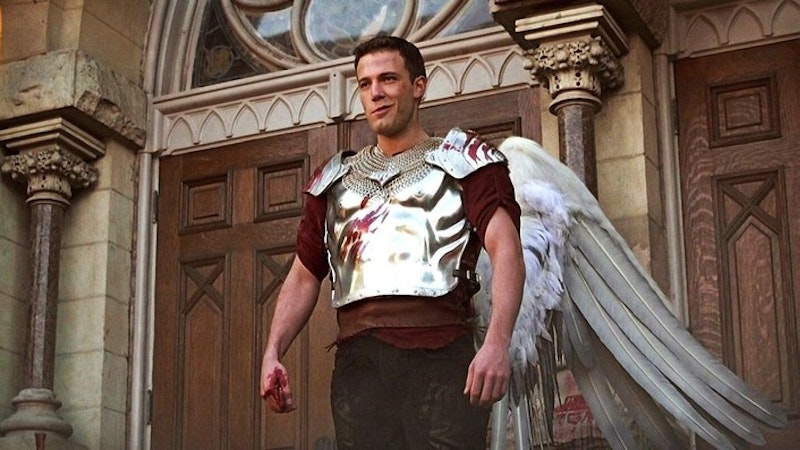Even if 2025 has been off to a shaky start at the domestic box office, there has been an unusual level of interest in revival screenings. Whether nostalgia or passion takes credit, the cinematic re-releases of films such as Pride & Prejudice, Princess Mononoke, The Goonies, and Happy Gilmore have proven that familiarity isn’t a detriment. Will audiences turn out to see a film that initially wasn’t a major success?
The most interesting aspect of the re-release of Kevin Smith’s 1999 fantasy comedy Dogma is that it’s the first legal opportunity that many will have to see it. Despite modestly positive reviews, Dogma didn’t connect with a broad audience in the same way that previous Smith films, such as Mallrats and Chasing Amy. The muted reception meant that Dogma was able to slip out of print on home video shortly after an initial wave of DVDs were released, with the rights purchased by Bob and Harvey Weinstein. The Weinstein brothers refused to make the film available on streaming, despite an outcry from Smith’s devoted fanbase. Years of clamoring eventually paid off, as the rights to Dogma were bought from Miramax by Iconic Events, which set up a national 25th anniversary celebration event.
The 1990s saw a wave of independent filmmakers going mainstream, as Quentin Tarantino, Richard Linklater, Steven Soderbergh, and Danny Boyle became star directors. Even then, Smith was an anomaly; during his time as a retail employee at a convenience store in his home state of New Jersey, Smith decided to hire his friends to make a low-budget, slice-of-life comedy about the misery of a seemingly infinite dayshift. Smith may have maxed out his credit card in the process, but Clerks was seen as a groundbreaking work that captured the authenticity of the working class in a way that Hollywood studio heads could never comprehend.
Clerks quickly blossomed into the centerpiece of an unusual cinematic universe that Smith created, which featured many recurring characters, gags, and popular culture inventions. Mallrats offered a sardonic look at the dating scene, and Chasing Amy presented the seemingly groundbreaking notion of transient sexuality (an achievement far more impressive in an era where Hollywood was terrified of the LGBT community). However, Smith’s passion had always been genre storytelling, as evidenced by the frequent references to Star Wars, The Lord of the Rings, and Ghostbusters within his films. Dogma was his first high-concept film, and 25 years later, it's still his best.
Although Smith had been set on retaining his group of childhood friends to be the stars of his films, Dogma gave him the unmissable opportunity to work with Ben Affleck and Matt Damon, a duo that was at the peak of their popularity for Good Will Hunting. Affleck and Damon are Bartleby and Loki, respectively, two angels kicked out of Heaven for being a nuisance. The bickering friends spent their time on Earth using their fantastical powers for their own amusement, but boredom has led them to prepare a return, in which they’ve planned to take advantage of a loophole in the Catholic dogma. The issue is that to exploit this error would be to prove that God is himself fallible, and would cause all of his creations to be non-existent.
While Dogma was subjected to the same level of vitriol that Martin Scorsese experienced a decade earlier with The Last Temptation of Christ, Smith is hardly the inflammatory figure that extremists made him out to be. Dogma’s analysis of the mythology behind religion isn’t much different from the conversations in Clerks, in which Randall and Dante argue about the contract workers that may have been killed when Luke Skywalker detonated the Death Star. Dogma isn’t anti-religion, but it’s opposed to those that don’t have a sense of humor about their beliefs.
Damon and Affleck never had a collaboration better than Dogma; Good Will Hunting was a Damon vehicle that Affleck played a small part in, and more recently, Air was an Affleck-directed feature that Damon happened to star in. Dogma is the only iteration of this formula in which they’re equals, yet also exists in an era before they became Jason Bourne and Daredevil, respectively. Dogma’s budget was around $10 million, so scenes of Loki and Bartleby goofing off played a much more significant role than any moments of spectacle. Smith’s subsequent work suffered from too many resources; some filmmakers work best when they’re forced to get creative with a meager budget.
Smith’s dialogue is often juvenile and crude, but feels authentic when handed to the right stars. As fun as the Affleck and Damon interactions are, the heart of Dogma is Linda Fiorentino, who starred as the abortion clinic owner Bethany Sloane, who’s revealed to be of ethereal descent. While a more cunning filmmaker may have used this as a means of startling religious zealots, Smith dared to suggest that faith doesn’t always come at an opportune time. What might’ve once been considered provocative in its offensiveness is now more subversive in its optimism; Dogma’s humor may belong in 1999, but its insights are modern.

